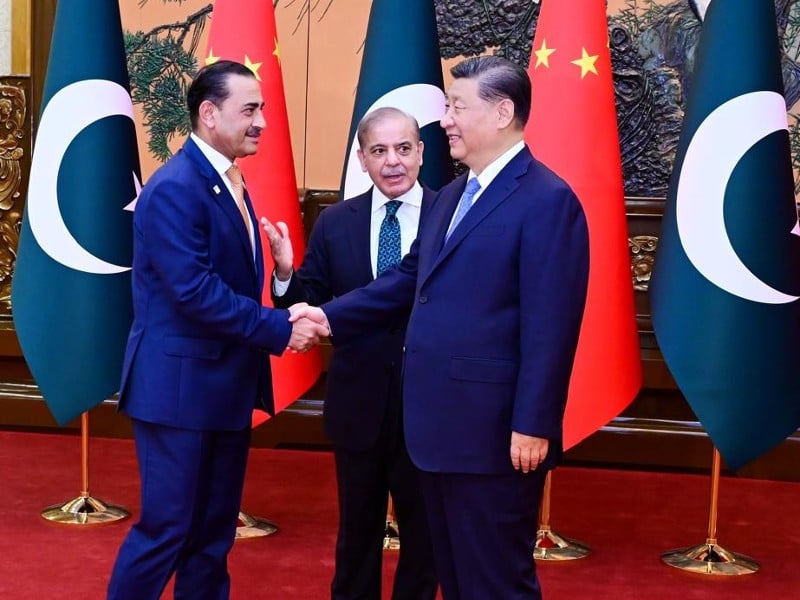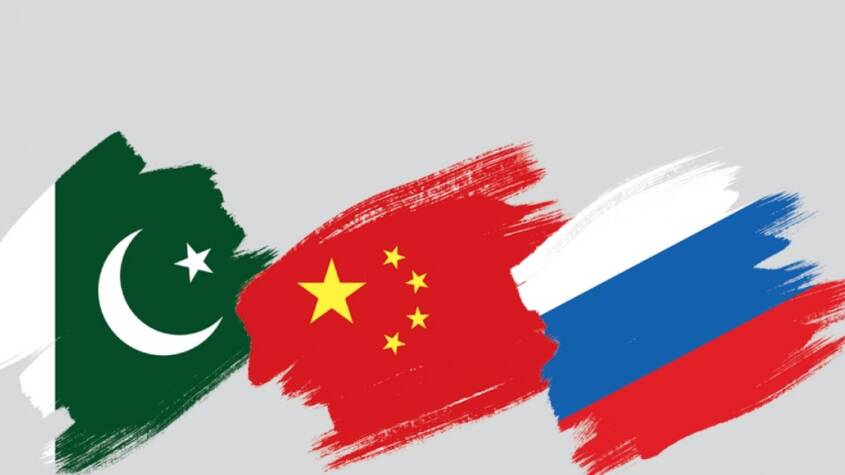By Shazia Anwer Cheema
The emergent realities of global security are fundamentally transforming the frame of references and trajectorial approaches toward them. New security architecture based on new security arrangements, new economic framework, and new civilization initiative provides an ideological underpinning for the future of global security architecture. Economic security, border security, and civilizational security may be intertwined but are not a total sum proposition like the post-Cold War phenomenon. International security in the past at least from the advent of Western colonization has always translated into a game of chess in which the king plays the central role and all the moves are taken to protect him or follow his position. So considering the world a grand chessboard makes the global security framework a total sum game of winning and losing. This has for sure divided the world into either friends of the king or enemies of the king, hence weaponizing economy, culture, and border security to further advance neo-liberal exceptionalism. It would be unnecessary to be too clichéd to discuss the colonial and post-colonial narratology regarding the cultural, civilizational, and economic destruction of the colonized. Although still in practice and fully functional as operative tools. The philosophy of consolidation of power to one axis has pushed the world into an overwhelming security dilemma, be it border and economic security or security of culture and traditions.
The colonial mindset of exceptionalism combined with post-Bretton Woods financial institutions gave us almost eight decades of unending wars, sanctions, currency monopolies, compromised supply chains, and defamed cultures and traditions. The less than 30% privileged exceptional ideas are being forcefully replicated in the population adhering to thousands of years of civilizations, oral history, folk wisdom, and protection management. The Western century of enlightenment was considered the enlightenment for the entire global population putting aside the obvious fact that Western enlightenment was a geo-political phenomenon related to specific geography and political evolutionary processes rest of the world had its own spatio-temporal enlightenment acquired much earlier than the border west. The question here is not who got out of the darkness first and why, but rather, whether or not Western enlightenment and the Western ideals born out of it such as liberal democracy, world order, humanity, and freedom of expression have practically any constructive capability to make a better world for the greater good of humanity? The answer to that is No. These Western liberal ideas are fundamentally flawed in relevance to the claims of being universal. Such as western liberal democracy is a shady term to install an aligned regime in any non-Western country, the Western idea of humanity is relative to the Western understanding of who needs empathy and the Western model of the economy is a weapon to coerce national economies.
The three centuries of brutal self-oriented Western experiments from colonization to globalization have destroyed the ideational and material culture of the rest of the 70% population, having civilizations of thousands of years old. The oldest civilizations of human history are situated in regions that are in Latin America, the Middle East, Far East, Asia Minor, Central Asia, and South Asia and these are the areas that have been subject to brutal wars and bloodshed by those who had history of less than 300 years. The aftermath in the form of a security dilemma begs to be resolved. The ancient collective wisdom and long-standing histories of the world civilization have joined together to reconstruct the new global security architect. Survival of living civilizations such as Cimmerians, Scythians, Chinese, Elamite, and Harappa and Indus Valley Civilization is based on the narrative of cohabitation instead of survival of the fittest therefore the collective wisdom of these regions is coexistence while Western collective thoughts believes in ‘purge and replace’. Thus Thucydides Trap is a historical fallacy misconstrued in the West as the justification to be in constant conflict with the emerging power. Thucydides has never advocated such an idea attributed to him he rather emphasized in his writings that politicians always have options.

From the BRICS Summit in Kazan, the SCO Summit in Islamabad, the Sochi Valdai Dialogue, and the Beijing Xiangshan Forum to the Margalla Dialogue Islamabad, all events of the year 2024 pivoted towards finding the solutions for coexistence instead of a ‘clash of civilizations’. All the geographic locations that have the ancestry of ancient civilizations have joined together to promote peace and a shared future. In all these events, statesmen, scholars, leading experts in finance and economies, militaries, border defense, think tanks, and security sat together and discussed the pressing topic of survival against the hegemonic forces. In all these settings, Security Cooperation, Global Prosperity and Stability, Multipolarity, Evolving International Order, Global South, World Peaceful Development, and International Mechanisms and Global Security Governance were major points of discussion for finding a ‘Right Way’ to get along with hegemonic Global North.
Russian President Vladimir Putin in the 21st annual Valdai International Discussion Club in Sochi stated that Russia does not view Western civilization as an enemy, but he questioned the Western attempt to inflict a “strategic defeat” on Russia. He also emphasized that the world is moving toward a multipolar order, which is being threatened by the “violent anarchy” fostered by the West in its efforts to maintain global dominance.
In Margalla Dialogue, COAS Gen Asim Munir also talked about coexistence while mentioning Indian extremist ideology that is a threat to synchronicity and stated that atrocities being inflicted by India in Indian Occupied Jammu and Kashmir and human genocide in Gaza and Lebanon were not serving humanity. He indicated that that Pakistan is of utmost importance for trade in Europe, Central Asia, and the Middle East and it has always played a positive role in regional and global peace. By indicating this, Gen Asim Munir might have in his mind the great Silk Road that in the ancient world used to connect all civilizations of that era.
In Kazan, while addressing BRICS leaders, Chinese President Xi Jinping expressed a similar viewpoint and stated that peace and development face severe challenges and collective wisdom and strength provide a base for building a community with a shared future for mankind. Like Gen Asim Munir, President Xi talked about peace in the Middle East and a comprehensive ceasefire in the Gaza Strip stopping the flames of war from spreading in Lebanon and ending the miserable suffering in Palestine and Lebanon.
The reason for referring lookouts of President Putin, President XI, and Gen Asim Munir is to display that representatives of the oldest civilizations of the world believe in coexistence, upholding peace, striving for common security, strengthening global security governance, and exploring solutions to address both symptoms and roots of hotspot issues. On the other hand, the countries having a living history of fewer than 300 years belonging to Global North are full of warmongers who are blind to see bleeding humanity in Indian Occupied Kashmir, Gaza, and Lebanon, and pushed Ukraine into Europe in unending war. One can justify their acts by stating that Western economies are built on the concept of a ‘war economy’ that is a transformation of the colonial economy. However, the exceptional rise of the Chinese economy in the last thirty years that trades peace and connectivity against wars has confirmed that the ‘war economy’ strategy is not as effective as it was in the 19th and 20th centuries. The 21st century brought new realities and is standing against and protectionism of Western hegemonic design. Additionally, the rise of today’s Russians from the ashes of the Soviet Union is another reason to believe that prosperity is possible without selling a ‘war economy’ although the West again sold a war economy to Ukraine to dent Russian rise.
In the first two decades of the 21st century, it has been proven that the Global South emerged to play an active and leading role in the global economic governance reform, and making development the core of international economic and trade agenda. Pakistan being the most important link of the Global South since the inception of the 21st century is under attack (war on terror—terrorism in Pakistan, digital terrorism, economic terrorism against Pakistan, etc) because the warmongers understand that a stable Pakistan would surely help the rise of Global South therefore this strategically important country is the target of warmongers. Understanding the situation, COAS Gen Asim Munir is trying hard to make Pakistan a destination of peace and prosperity while connecting economic powerhouses of the Global South under the umbrella of the SIFC initiative.
To my understanding SIFC is just not an investment platform rather it is launched to link global economic interests with Pakistan so that all emerging global powers would help Pakistan come out of the sluggish situation that Pakistan is facing today. A prosperous and resilient Pakistan is not in favor of Pakistan only rather it is a must for the goals set by Global South to be achieved before 2030 and we need exchanges among civilizations, enhanced communication and dialogue, and support for each other in taking the path to transformation suited to our respective national conditions.

In the end, I would like to share what President XI believes in. At the Kazan Summit, he talked about the power of old civilizations and added that his Global Civilization Initiative is for the purpose of building a garden of world civilizations in which we can share and admire the beauty of each civilization. To achieve this target, all toads to Sochi, Kazan, Beijing, and Shanghai go through Islamabad.
